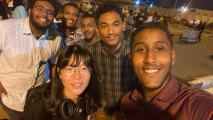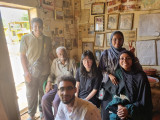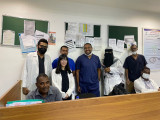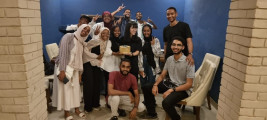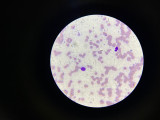Juan Kim, a fifth-year student of General Medicine, spent a month in Sudan for the SCOPE program of IFMSA. She sends an essay and pictures.
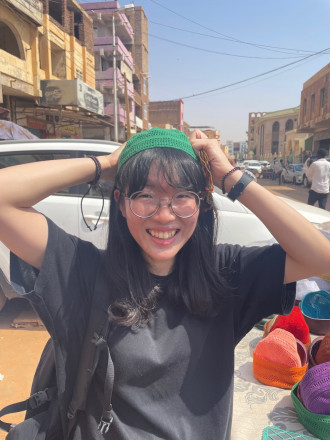 I spent a month in Sudan for the SCOPE program of IFMSA in August 2022, and I’m glad to share experiences and thoughts I earned there.
I spent a month in Sudan for the SCOPE program of IFMSA in August 2022, and I’m glad to share experiences and thoughts I earned there.
I remember it was during the Christmas holidays when I received an email that there’s a space left for the Sudan SCOPE program for IFMSA. I’ve been interested in the field of Tropical Medicine since I was in high school. There was a book in the school library about parasites and NTDs (Neglected Tropical Diseases). It was written by a Korean author who has been convincing people to pay more attention to parasites and to neglected people who are infected with them. And I’m one of the people who got convinced by him. Before the Covid pandemic, I was planning to go to Sudan with a research group on Schistosomiasis from Korea in 2020 but it got canceled due to Covid-19. So I was already vaccinated and mentally prepared to go to a tropical country where I had never been, so it was comparably easy to make a decision to apply for Sudan for the SCOPE program. I thought it would be a perfect time to experience the field before I graduate.
So I had quite a few reasons to go Sudan, but the political situation there wasn’t so favorable at the time (and still). When I was preparing processes, I realized that if I had gone to visit some countries including Sudan, I wouldn’t have been able to go to the US without Visa anymore as a Korean citizen. That made me consider for a bit. Since I don’t have a plan to visit the US yet but want to work in the field of Tropical Medicine, I concluded that it will be an essential experience to have to make a decision for my future career. Even though now I’m going to visit the US for my friend’s wedding, I am happy that I made a decision that affected my whole point of view for life. I learned that sometimes there are times that I can’t be done anymore if I miss a chance.
After a short journey to get an entry visa, I arrived in Sudan on the last day of July. I arrived at my home stay place at 3 a.m. I started my internship a few hours after the arrival.
In Sudan, they learn medicine in English and doctors write medical reports in English. Most of the doctors were able to explain in English and it was very smooth to follow and understand cases. Usually doctors do communicate in Arabic, but when I was there, they were presenting in English in morning rounds, so there were not so many difficulties in communication.
I mainly worked in the ICU department and in different internal departments in the Police Hospital in Khartoum. In the ICU, there were many critical patients with wide ranges of diseases and traumas from gunshot wounds to malaria infection. I could closely look and learn how the doctors worked on each case. Even though due to a shortage of medical supplements some indications were different from the international guidelines, it was still a good practice to apply theoretical knowledge and learn what to do in a resource-limited situation. But it would be nice to have knowledge on international guidelines or guidelines in your country to know the gold standard so that it wouldn't confuse you later. Once a week, I did a night shift in the ICU and stayed in the hospital for around 30 hours. It was very dynamic and there were many collaborations with different departments. Sometimes patients needed acute intervention, such as acute intubation. After some observations, doctors let me do and participate in some procedures under supervision, such as ABG, inserting nasogastric tube, assisting in intubation, and central line placement. I also did my practicals in internal departments: gastroenterology, cardiology, pulmonology, nephrology. I joined their morning rounds, outpatient clinic, Echo lab, dialysis unit. Since there are many endemic tropical diseases in Sudan, I met many patients with those diseases, such as schistosomiasis, malaria, leishmania, HIV, HAV and HBV. It was a valuable experience to do a physical examination and see real clinical cases of them. A few times, I went to different institutes more focused on tropical medicine. In research centers, I learned and practiced different methodology diagnosing tropical diseases: differentiating malaria species with light microscope, pcr, rapid antigen test; detecting leishmania on LM, cultivating TBC and chip pcr. I joined a seminar held by WHO to educate local health care workers from different cities and countries how to use machines that are practical to use in the field area where there is unstable electricity. It was great to see and learn what programs can be actually helpful and good to be organized and provided. I experienced a wide range of tropical medicine from clinical to laboratory thanks to the academic team of IFMSA of Ribat University. It was nice to communicate and make the schedule together with them. It was a really vivid learning experience which cannot be compared with studying only on the textbooks and on the screen.
Besides the internship in the hospital, there were also social programs with the local students. Since it was during the rainy season, some trips and events got canceled. But we managed to go see pyramids and a local market, went to henna place, went bowling and some music events with Sudanese traditional instruments. Also we had a barbeque party at a farm together with local band music.
Sudan is a country with a long history of pain with its independence. It was one of the countries which were leading medicine in Africa in the past, but now it is going through a difficult time with military dictatorship and corruption. Through this, I learned how the country's situation affects the health of the citizens. After coming back from Sudan, it feels weird that there are different worlds on the same planet. In some countries even in the capital city people are dying due to lack of medical supplements, but people in other parts of the world don’t talk about it and have a normal calm life. I still pay more attention and use lots of energy to myself and to the surroundings. I am trying to keep it in mind that even though I don't see it, things are still happening beyond my life. I hope we can lift our eyes from ourselves and feel their pain and try to take part of it. From the lessons learned in Sudan, I want to become a doctor who helps people to raise their voice to improve health inequality in the field of tropical medicine.
My last comment is that even though I had great lessons in Sudan, I would only go back with a group of people who could ensure my safety. There were quite a few moments that could’ve been dangerous. I didn’t mind the hygiene or lack of warm water and electricity, but when it comes to the safety, it didn't feel okay. It might've happened because I was the only exchange student at the exchange university, but most of the time I had to take a taxi by myself to go to the hospital which on average took two hours back and forth. It was hard to communicate with the drivers and sometimes they went in the wrong direction and asked for more money or a driver was high and looked dangerous to drive. One time a motorcycle rider randomly threw teargas while I was walking on the street. Mentally disoriented person kept following me so I had to enter somewhere and wait until he left. I am listing those not to discourage you but to let you know it could happen and be prepared and discuss with your exchange university beforehand. Before I went to Sudan, I didn't expect that there would be a moment I would be alone on the street. Hope you are aware of it and have nice experiences and meet good people on your exchange.
Thanks to the IFMSA organization for the opportunity to experience a wider world and open my eyes. I hope I could encourage those students who are hesitating to apply for the program to grab a chance and have a safe stay in exchange. Thank you for reading my long essay!
